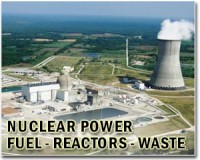 |
Tokyo (AFP) May 6, 2010 Japan restarted its controversial "fast-breeder" nuclear reactor Thursday, 14 years after the plant was shut down following a fire and a subsequent cover-up that sparked public anger. The Monju Prototype Fast Breeder Reactor, located in a coastal town 350 kilometres (220 miles) west of Tokyo, was reactivated for the first time since the December 1995 accident, the Japan Atomic Energy Agency said. Unlike regular light-water reactors that run on uranium, fast-breeders use a mix of plutonium and uranium, including waste from conventional reactors, and generate or "breed" more plutonium than they consume. Major industrialised nations initially rushed to develop the "dream reactors", but technical problems and fears over the proliferation of weapons-grade plutonium have led many to withdraw from the projects. The United States, Britain and Germany have suspended fast-breeder projects and France shut down its last such reactor last year. The United States and France continue research and development of the technology. Besides Japan, Russia and India are now the only nations that operate fast-breeder reactors, with China also hoping to start this year. Japan, an energy resource-poor nation with plans to expand its nuclear power sector, gave the green light for the Monju relaunch earlier this year, with a target of commercialising fast-breeders by 2050. On Thursday morning, Monju director general Kazuo Mukai declared that the nuclear reactor was reactivated after one of its control rods, which had been inserted to prevent an atomic reaction, was lifted. Dozens of workers in the control room clapped in celebration. The reactor is expected to reach criticality -- the point when a nuclear chain reaction becomes self-sustaining -- on Saturday but is not scheduled to generate power at full capacity until 2013. Monju's relaunch was delayed for years in part because of outrage over the accident and the cover-up by the operator, which had initially released altered video footage of the fire in the facility. In the 1995 accident, which came only months after the plant had started generating electricity, sodium coolant leaked from a pipe and, reacting with oxygen and moisture, sparked a fire. No one was injured and no radioactivity released. Safety inspections later found more problems in the shuttered plant, including a corrosion hole in a ventilation duct that would have leaked radioactive emissions outside the facility. "I never thought it would take so long to restart Monju," said Japan Atomic Energy Agency adviser Hiromi Tanabe, who recalled joining the 1995 clean-up. "We know by now how important it is to disclose information to the public." Japan, the world's second largest economy, has few energy resources of its own and relies on the nuclear power generated by more than 50 plants for nearly a third of its domestic electricity needs. Opponents of nuclear power stress the risk of earthquakes in Japan, which is located at the intersection of four tectonic plates, dotted with volcanos and is regularly hit by strong tremors. The Tokyo-based group the Citizens' Nuclear Information Center said: "We believe that Monju is an accident waiting to happen and that it is, therefore, irresponsible to restart the plant." The group said the during the plant's long closure its equipment and piping had aged and that two active seismic faults below the site had now been recognised. "We demand that the government stop playing Russian roulette with our lives and permanently close down Monju," the group said. In July 2007, the world's biggest nuclear plant, Kashiwazaki-Kariwa, northwest of Tokyo, was shut down by a strong tremor, although no one was hurt. Only two out of its seven reactors have resumed operations.
Share This Article With Planet Earth
Related Links Nuclear Power News - Nuclear Science, Nuclear Technology Powering The World in the 21st Century at Energy-Daily.com
 Greenpeace alerts WHO over Areva Niger mines
Greenpeace alerts WHO over Areva Niger minesGeneva (AFP) May 6, 2010 Greenpeace on Thursday reported French nuclear group Areva to the World Health Organisation, accusing it of endangering the local population with radioactive waste from its uranium mines in Niger. The environmental pressure group sounded the alarm last month over Areva's two mine sites at Arlit and Akokan in northwestern Niger, saying waste was contaminating the soil, air and water in the re ... read more |
|
| The content herein, unless otherwise known to be public domain, are Copyright 1995-2010 - SpaceDaily. AFP and UPI Wire Stories are copyright Agence France-Presse and United Press International. ESA Portal Reports are copyright European Space Agency. All NASA sourced material is public domain. Additional copyrights may apply in whole or part to other bona fide parties. Advertising does not imply endorsement,agreement or approval of any opinions, statements or information provided by SpaceDaily on any Web page published or hosted by SpaceDaily. Privacy Statement |